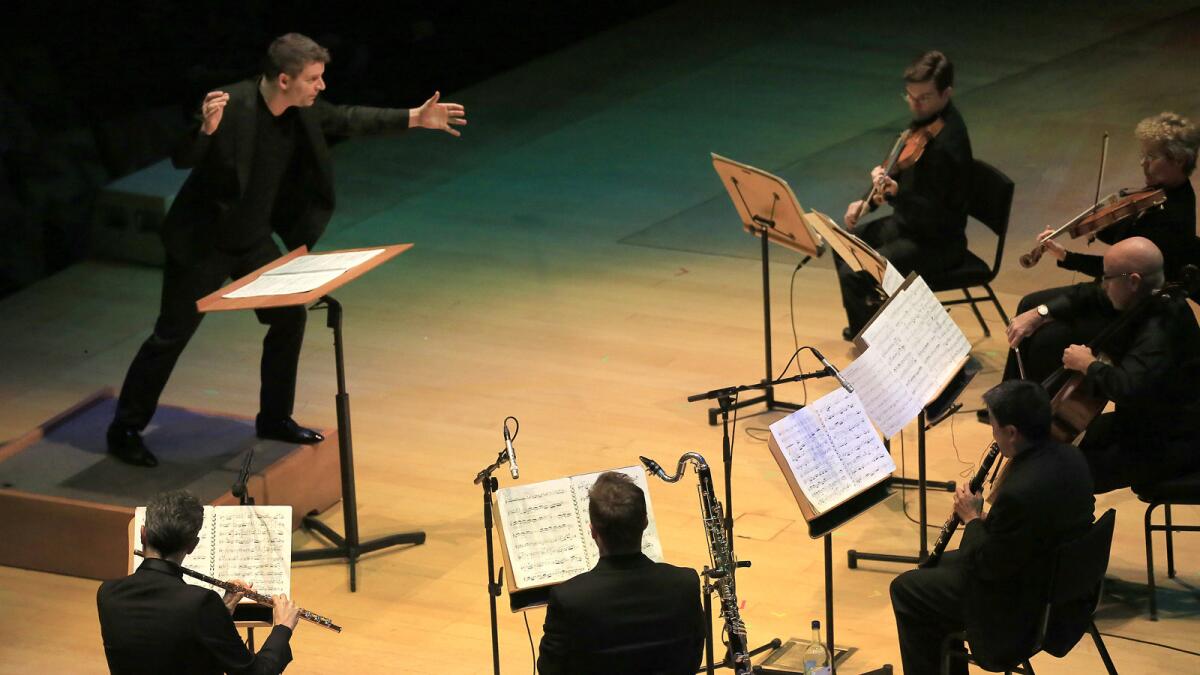Review: Green Umbrella: A fascinating journey into the European avant-garde

- Share via
For the latest installment of the L.A. Phil’s Green Umbrella adventure series, the designated journey was to a place called the “European Avant-Garde,” a generic but accurate moniker for a program of new music (plus a mid-20th century classic by Karlheinz Stockhausen) by composers from Germany, Switzerland and Italy.
But the title of the concert Tuesday at Walt Disney Concert Hall also strained a bit from redundancy, given that avant-garde movements and notions of significance have mostly come from across the Atlantic over the last century, apart from the radical populist chic of American Minimalism (which has had plenty of play in this hall).
More to the point, though, the real emphasis of this avant-garde field report — a compact but fascinating and mind-expansive evening helmed by masterful and forward-leaning composer-conductor Matthias Pintscher — was a rare exposure to what “avant-garde” might mean in 21st century concert music terms, European-style.
Pintscher, in his L.A. Phil debut, was a ripe candidate for this task, as a German with a self-admitted French aesthetic leaning who was appointed by Pierre Boulez to the prestigious post as head of the Parisian Ensemble intercontemporain, among other posts and guest shots around the world. He is deeply enmeshed in and helping to shape music of our moment, and he made a powerful presence Tuesday, both as conductor of the fully engaged L.A. Phil New Music Group players and as composer, with the West Coast premiere of Pintscher’s “songs from Solomon’s garden,” featuring ascendant (and Santa Barbara-bred) young bass-baritone Evan Hughes.
But for this mostly-21st century occasion, some historical perspective and sense of artistic precedent was in order, in the form of Stockhausen’s legendary “tape” piece from 1956, “Gesang der Jünglinge” (Song of the Youths).
Disney Hall was plunged into near darkness and the audience subjected to the work’s hypnotic, swirling spatial experience, with the voice of a boy (Josef Protschka) intoning quasi-biblical lines in ways both clear and abstracted, conjuring up a near-mystical character whose now “antique” sonic means do nothing to diminish. The piece seems to have attained a timeless state of grace, especially heard in a majestic/postmodern space like Disney Hall.
Continuing with an electronic theme, subtle digital textures blended beautifully with a small chamber ensemble in the late Italian composer Fausto Romitelli’s 2001 “Amok Koma,” whose palindromic title touches on the structural inversions and morphing nature of the piece. Rock elements merge with the timbrally sweeping tactics of the French “spectral” style, to coolly entrancing ends.
Similarly, Swiss composer Beat Furrer’s 2012 “linea dell’orizzonte” (line of the horizon) — the newest work of the night, in its U.S. premiere — sculpts its largely atonal, timbre-sensitized language with the addition of electric guitar for extra-classical sound and context. A taut, chattering energy turns to a more freely fluid exploration of color and collective gestures, ending with an eerily gentle air.
Post-intermission, elements of the music heard earlier in the program resonated with a new, personal touch in Pintscher’s longer work “songs from Solomon’s garden,” its carefully structured and sometimes Hebrew text sensitively delivered by Hughes (a role originally sung by Thomas Hampson).
As heard in this piece, and through this memorable performance, Pintscher has a poetic and painterly way with musical materials, which can be astringently atonal at the core, but also graced with a special brand of lyricism and attention to sonic and ensemble detail.
The European avant-garde has spoken, and persuasively so.
More to Read
The biggest entertainment stories
Get our big stories about Hollywood, film, television, music, arts, culture and more right in your inbox as soon as they publish.
You may occasionally receive promotional content from the Los Angeles Times.










